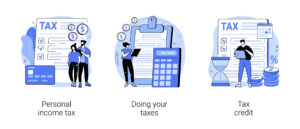What Do You Do When You Owe Taxes But Don’t Have the Funds?
For many people tax season brings the joy of a nice big refund to go out and splurge on something they’ve had your eye on for a long time. On the flip side of the equation are those people who surprisingly, or not, end up owing the IRS money. Not only do these people miss out on the extra cash influx, but they also have to come up with the funds to pay off the extra tax bill.
For some people, depending how high the bill is, they could have to pay even more than just the shortage amount. That’s because many times when people underpay they end up owing penalties for the underpayment. For those who owe a lot of money, those penalties could end up being huge. In fact, the penalties can even be much higher than the shortage.
That’s why it’s always best to try to avoid owing any money to the IRS, especially if you don’t have the funds to pay it off when the tax bill comes due. So what happens to people who can’t pay their tax bill? You do have a few options.
In some cases, it might be a good idea to take out a loan or a line of credit in order to pay off the bill. Of course, you will then be responsible to pay off the loan, so use caution. Another option is to apply for an extension with the IRS. This could buy you a little time to come up with the needed funds. If you need even more time then try applying for a hardship extension, which could give you up to six months to pay it off. You could also ask the IRS for permission to set up a payment plan to pay off the debt in installments.
Whichever path you decide to take, make sure you do something. Don’t ignore the problem or it will only get worse. The penalties will likely increase the longer you wait and the IRS could eventually take other measures or even press charges. So the bottom line is: do something.
Income the IRS Can’t Touch
Income the IRS Can’t Touch There’s one readily available and legal source of untaxed income that we know of: municipal bonds. These securities are issued by state and local governments, school districts, hospitals and other public agencies to support community projects and services. To permit these worthy endeavors to raise money economically, Uncle Sam exempts…
Avoiding Real Estate Tax Revaluations
Avoiding Real Estate Tax Revaluations by Steven Singer, CPA As a result of the passage of Proposition 13 almost thirty years ago, real estate owners currently enjoy paying property taxes based on the property’s purchase price, value of improvements and an annual increase of 2% over the previous years’ assessed value. As a result of…
Annuities in Qualified Retirement Plans
Annuities in Qualified Retirement Plans By Russell Hill Using annuities in qualified retirement plans. Qualified annuities reduce your current taxable salary in addition to accumulating tax deferred earnings, when you contribute money to an annuities program through an employer (as one of the investment options in a salary reduction retirement plan). Those who work for…
Paying Too Much In Taxes?
Paying Too Much In Taxes? By Theodore Lanzaro Now that the end of the year is near, it is time to review a few business tax tips for 2008. Anyone who owns a business or is planning to start a new business in 2008 should be thinking about maximizing the profitability of their business and…


